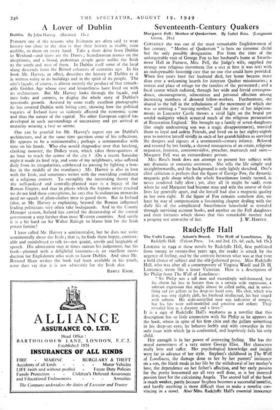Dublin. By John Itarvey. tllatalord. 15s.)
PERHAPS one of the reasons why Irishmen are often said to wear history too close to the skin is that their history is visible, even audible, to them on every hand. Take a short drive from Dublin to Wexford—and there arc the Danes ; Scandinavian names on the shopfronts, and a blond, pedestrian people quite unlike the Irish to the south and west of them. In Dublin itself some of the local slang descends from the Bristol colonists of centuries ago. In his book Mr. Harvey, in effect, describes the history of Dublin as it is written today in its buildings and in the spirit of its people. The city's façade, of course, is almost entirely the product of that remark- able Golden Age whose ease and leisureliness have lived on with its architecture. But Mr. Harvey looks through the façade, and into holes and corners, to display the whole story of Dublin's spasmodic growth. Assisted by some really excellent photographs he has covered Dublin with loving care, showing how the political vagaries of Ireland have so violently affected the economic scene and thus the nature of the capital. No other European capital has developed in such surroundings of uncertainty and yet arrived at maturity wearing a face so serene.
One can be grateful for Mr. Harvey's expert eye on Dublin's architecture, and at the same time question sonic of his reflections. He appears to be a sentimentalist ; perhaps a sentimentalist with time on his hands. Who else would rhapsodise over that lurching, clanking monster, the Dalkey tram, which takes three-quarters of an hour to reach the centre of the city ? (On a recent Saturday night it made its final trip, and some of my neighbours, who suffered daily from its irregularities, celebrated its passing by lighting a bon- fire in the middle of the tramlines.) Mr. Harvey is also in love with the Irish, and sometimes writes with the overriding confidence of a religious convert. To exemplify the interesting theory that the well-policed and centrally-planned state is a legacy of the Roman Empire, and that in places which the legions never reached we do not find these conceptions, he says that Scandinavian monarchs need no squads of plain-clothes men to guard them. But in Ireland (also, as Mr. Harvey is explaining, beyond the Roman influence) leading politicians very often take bodyguards. And in the County Manager system, Ireland has carried the dictatorship of the central government a step further than most Western countries. And surely it is a bit hard on Sir Walter Raleigh to blame him for the Irish potato famine!
I have called Mr. Harvey a sentimentalist, but he does not write sentimentally about the Irish ; that is, he finds them happy, comfort- able and uninhibited to talk to—not quaint, servile and laughable of speech. His admiration may at times outrun his judgement, but his book—planned with a delightful looseness—is an excellent intro- duction for Englishmen who wish to know Dublin. And since Mr. Bernard Shaw wishes the book had been available in his youth, none dare say that it is not admirable for the Irish also.
RAWLE KNOX.


































 Previous page
Previous page